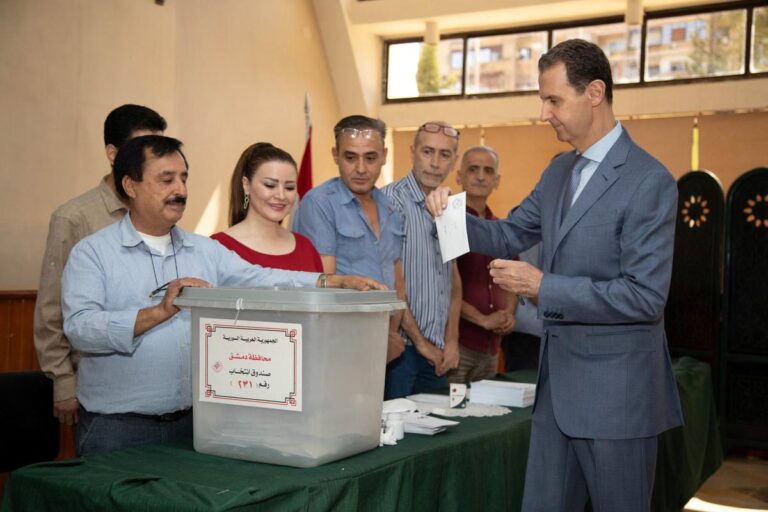Syrians voted for new members of parliament in elections held on Monday, July 15, 2024. The elections were expected to produce few surprises, but could also pave the way for constitutional changes that would extend President Bashar Assad’s term in office.
The vote was Syria’s fourth since mass anti-government protests in 2011 and a brutal crackdown by security forces led to an ongoing civil war and comes as an economic crisis hit the country and intensified protests in the south.
Syria’s 2024 parliamentary elections will exclude rebel-held northwestern Syria and the northeastern part of the country controlled by the U.S.-backed Kurdish-led Syrian Democratic Forces. Eligible voter numbers have not been released, and unlike in presidential elections, millions of Syrians living abroad, who have swelled since the civil war, are not eligible to vote in parliamentary elections.
Western countries and Assad’s critics say the vote in government-controlled areas of Syria was neither free nor fair.
This year, 1,516 government-endorsed candidates are running for the 250-seat People’s Assembly. Some 8,151 polling stations have been set up in 15 constituencies in government-controlled areas, with results due to be announced on Monday night or the following day.
In the last election in 2020, results were delayed by several days due to technical issues, officials said. Assad’s Baath Party won 166 seats, allied parties won 17, while independent candidates won 67.
The poll comes as Syria’s economy continues to deteriorate due to years of conflict, Western-led sanctions, the COVID-19 pandemic and reduced aid due to aid fatigue.
Meanwhile, the country’s currency has fallen to a record low against the dollar, sparking food and fuel inflation.The government also partially rolled back subsidy programs almost a year ago while doubling salaries for civil servants and pensioners.
Voters told The Associated Press that a key issue was reviving Syria’s stagnating economy.
“We hope that our trust in the new lawmakers will have a positive effect on the country and improve the situation,” Ahmad Al-Afoush, 40, said after voting in Damascus.
Shireen Al-Fraif hopes that the new parliament will proactively take measures to improve living conditions in Syria.
“I’m not saying the predecessor wasn’t good, I just want them to improve,” the 47-year-old engineer said.
In the southern, Druze-majority province of Sweida, where the economic crisis has sparked periodic anti-government protests for nearly a year, many have called for a boycott of the vote. Videos posted online by local activist media group Sweida 24 and others showed protesters snatching ballot boxes from a truck to prevent voters from reaching polling stations.
Elsewhere, campaigning was low-key, with candidates focusing mainly on popular slogans such as national unity and prosperity.
Vladimir Pran, an independent adviser on the transitional political and electoral process, said that the competitive part of the Syrian electoral process takes place before the polls open, and is the stage at which the list of voted Ba’ath Party candidates is sent to the party’s Central Command, allowing candidates to run in the elections.
“With the primaries over, the election is over,” he said. Once the Baath Party’s slate of candidates is complete, “you’ll check the slate and you’ll see that literally every one of them will make it to parliament.”
The number of incumbent lawmakers on this year’s shortlist is relatively low, suggesting some personnel shuffling within the Baath party.
Maroun Sfeir, a consultant on transitional elections and political processes, said the Baath Party’s 169 candidates alone exceed the 167 MPs needed to propose constitutional changes and protect the president from charges of treason and vetoing bills.
He also said 16 candidates from parties allied with the Baath Party were running on the same list, “just three away from the three-quarters majority of parliament members needed to pass the constitutional amendments.”
This leaves 65 vacancies for independent candidates, but Sfeir said they could not be expected to form a real opposition force.
“They are all pre-screened to ensure they are loyal and pose no threat,” he said.
President Assad faces an end to his term in 2028, and the next parliament is widely expected to try to pass constitutional amendments to extend his term.
This is a premium article available only to subscribers. To read over 250 premium articles every month,
You’ve reached your limit for free articles. Support quality journalism.
You’ve reached your limit for free articles. Support quality journalism.
You have read {{data.cm.views}} from {{data.cm.maxViews}} Free articles.
This is your last free article.

